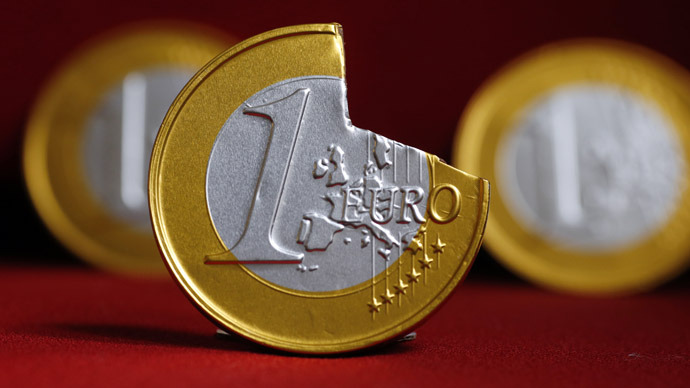‘There is absolutely no way eurozone could last forever’ – MEP

Eurozone is coming to pieces and a north and south split is inevitable, the leader of the UK Independence Party Nigel Farage told RT.
Once it happens the question will be what is the EU for? The
member of the European Parliament thinks he knows the answer.
RT:The European Parliament is now discussing an anti-crisis plan, which has already been used for Cyprus. They are to decide whether or not to use it in other European economies. Should other countries be worried?
Nigel Farage: Investors should be worried all over. I’ve been pondering for years what would happen when Spain finally went bankrupt. How would they possibly deal with the sheer scale of the bailout that would be needed, which perhaps would be 5-6 billion euros? How could this happen without huge American support and global help. What Cyprus has done is given us a template of what they will do in the future. They will bail out the countries by stealing investors’ money, by taxing people on their properties, by forcing central banks into selling their holdings of gold. This is a truly astonishing situation and I must say I found it amusing to see Prime Minister Medvedev teasing the EU and say that this is what happened in the worst days of the Soviet Union. And I now believe that what is happening in the name of holding together the eurozone is effectively the new communism.
RT:If the plan is given the green light will people accept it?
NF: In a sense they may not have much choice. If their money is on bank accounts and literally that money is stolen from them without them having to give their consent then it’s difficult to say what they can do. If people are asked to pay excessive taxes on the value of their properties again they can refuse to pay, I suppose, but then they’ll face court and potentially prison. So my advice to people is if you have property and money in bank accounts in the eurozone get your money out before they come after you, because it’s perfectly clear that is their plan heading on from here.
RT:Would dissolving the Troika fix the problem in your opinion?
NF: It’s quite right that there should be criticism of the Troika. It’s quite extraordinary that in all these troubled countries of the eurozone they’ve effectively given up parliamentary democracy and handed it over to a very arrogant Troika. But it’s all well and good for the members of the European Parliament to criticize the Troika, but one power that this parliament has is the ability to call the European Commission to account. They are able to call them to a chamber and to have a confidence debate on their actions. And given that they make up one third of the Troika, rather than hot air from parliamentary colleagues, I would much rather see them supporting my plan, which is to get the European commission next month in this building [the European Parliament], and let’s have an confidence debate on the way they’ve behaved as part of the Troika.

RT:Some members of the European Parliament suggest that the North and the South of Cyprus unite to improve investment climate on the island. Do you think this could help?
NF: I think the prospect of reconciliation between the two parts of Cyprus is very long way away. I don’t think that’s realistic. I also don’t think the EU is capable of brokering this deal. Even if it is, even if it did do so that is not going to solve the eurozone crisis. The simple fact is that Cyrus or any other Mediterranean country should never have joined the Eurozone. There were some of us in this building warning at the time that it wouldn’t do. We’ve now split Europe north to south in the most awful way. And it’s perfectly clear that the Troika and the institutions of the European Union will use every power necessary to try to keep this failure together.
RT:There also an offer to create in the European Parliament an investigating committee on the Cyprus crisis. Could it help?
NF: No, that’s absolutely a waste of time. The European Parliament wants to exert its power. The EU parliament really feels that the Troika has behaved badly and that effective theft of money from people’s bank accounts shouldn’t have happened. It should use the one power that the European treaties give – it should call the European Commission to account. But they lack the courage to do the one thing they could do.
RT:Do you think the current economic crisis in the eurozone could lead to the split of the EU?
NF: Ultimately yes. There is absolutely no way that the eurozone could last forever. They may keep it going for a few more years by invoking even more extreme measures. But ultimately the eurozone is going to break up. It may be the economics, civil disobedience or violence on a large scale that eventually get some of the Mediterranean countries out. And after that the big question will be what is the EU for? I think the alternative model is Europe based on cooperation, trade, nation state democracy. I think that vision is one that can only grow in support as years go by.
The statements, views and opinions expressed in this column are solely those of the author and do not necessarily represent those of RT.












